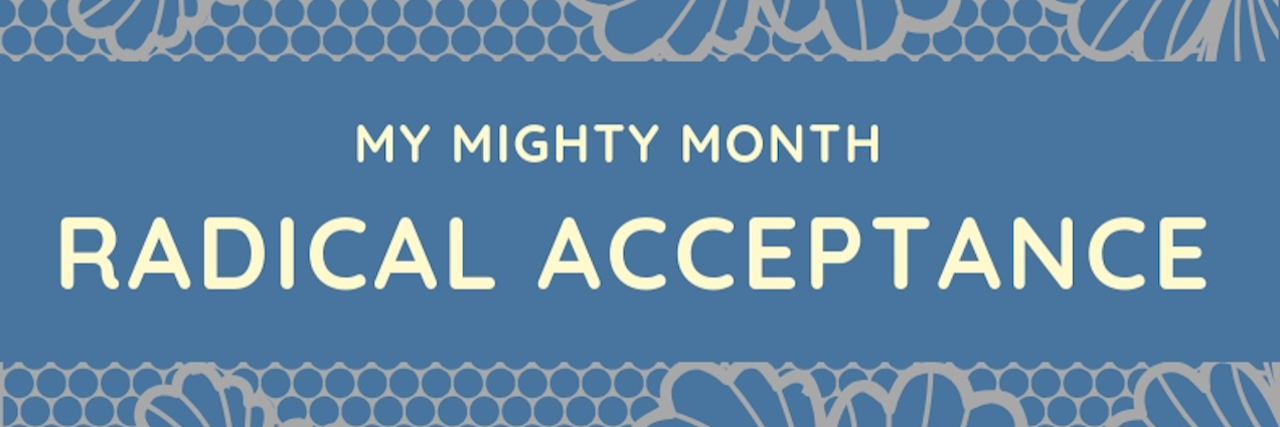If you ask my therapist to describe me in one word, I have a suspicion she’d say “resistant.” Many times we’ll discuss what I’m struggling with — perhaps remembering to take my antidepressants, for example — and she’ll offer several helpful suggestions. Maybe I could set an alarm or get a pill organizer or move them to the counter where I’ll see them. Brief pause. “No, I don’t think any of that will work,” I say.
Underneath my stubbornness is fear that accepting my mental illness (taking meds in this case) means I’m giving up. If I accept I struggle, I’m not working hard enough to “fix” the issue. If I accept I sometimes need help, I have to stop trying to control everything. That’s uncomfortable, and frankly, terrifying. So I keep resisting. However, trying to “muscle through” or refusing to make changes in treatment, whether you have a mental illness, chronic illness or disability, doesn’t help. Radical acceptance can help.
Radical acceptance means we accept the present moment without judgment. We don’t have to like it, we just have to acknowledge it. “Radical acceptance rests on letting go of the illusion of control and a willingness to notice and accept things as they are right now, without judging,” Marsha Linehan, a psychologist and creator of Dialectical Behavioral Therapy (DBT), said. Then we suffer a little less in hard situations.
Radical acceptance comes from DBT, a type of therapy that teaches mindfulness, emotion regulation, distress tolerance and interpersonal skills. DBT was developed in the 1980s by Linehan, who saw that we needed a better treatment for borderline personality disorder, self-injury and persistent suicidal thoughts. Radical acceptance, a distress tolerance skill, is like pressing a pause button in an emotional situation. During the brief time out, we have an opportunity to make a change. Acceptance isn’t giving up, it’s creating space to do something differently.
“In order to make changes in our lives, we have to be able to accept the way things are,” Susan Voss, LPCC, a DBT therapist and owner of Advanced Behavioral Health in Minnesota, told The Mighty. “If a person believes they need to make a change in their lives, they must also accept the way they are doing things is not working.”
“Radical acceptance rests on letting go of the illusion of control and a willingness to notice and accept things as they are right now, without judging.” — Marsha Linehan, DBT founder
Whether you’re a radical acceptance newbie like me, a wise radical acceptance sage or somewhere in the middle, our My Mighty Month challenge for every day in October is practicing radical acceptance. “The best way to gain radical acceptance is to work on it daily,” Voss said.
We’re going to work on radical acceptance in three phases. First, we’ll practice accepting something small and less emotional — an annoyance like heavy traffic or that time your sibling ruined your favorite toy. Next, we’ll try to accept something at a medium level, like a challenging relationship with a friend or a tricky work situation. Then we’ll start working to radically accept a big thing, like an illness or a major loss.
I’m going to work on accepting that sometimes drivers cut you off in traffic as my easier goal, the need to take my antidepressants daily as a medium-level goal and finally work toward radically accepting that my mental illness makes my life harder sometimes. Here’s a goal sheet where you can record your radical acceptance goals for the month.
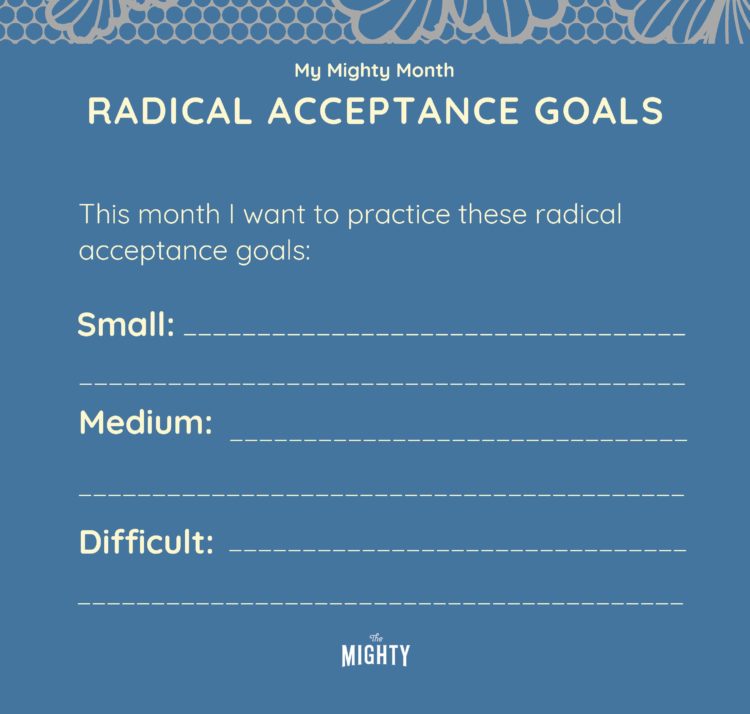
(Click here for a downloadable PDF or here for one you can fill out digitally.)
Plus, share your goals with the rest of The Mighty’s community here. 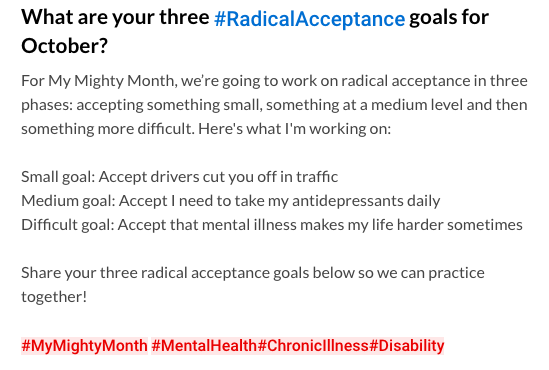 To practice radical acceptance, pay attention to your thoughts. Each time a judgment or resistance comes up about one of your goals, you can use a coping statement to pause and change the story. For example, when a rude driver cuts me off in traffic, I might tell myself, “It’s a waste of time to fight what’s already occurred.” This statement helps me accept the moment and diffuses my anger. So instead of chasing the driver to yell at him, I can change my behavior and safely stay in my lane. Below is a list of other coping statements that might be helpful for your radical acceptance practice.
To practice radical acceptance, pay attention to your thoughts. Each time a judgment or resistance comes up about one of your goals, you can use a coping statement to pause and change the story. For example, when a rude driver cuts me off in traffic, I might tell myself, “It’s a waste of time to fight what’s already occurred.” This statement helps me accept the moment and diffuses my anger. So instead of chasing the driver to yell at him, I can change my behavior and safely stay in my lane. Below is a list of other coping statements that might be helpful for your radical acceptance practice.
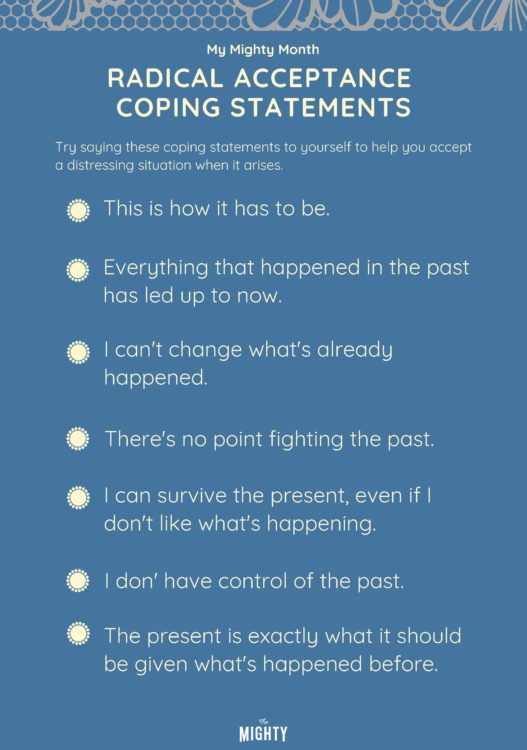
(Click here to download a PDF version of the coping statements.)
In addition to coping statements, analyze your radical acceptance for each goal. Take yourself through an emotional situation step-by-step. What happened? What led up to the event? What was your role in the outcome, and what role did other people play? What do you have control of, and what don’t you have control over? What was your response to the situation and how did it make you feel? How can you use radical acceptance to respond differently in the future?
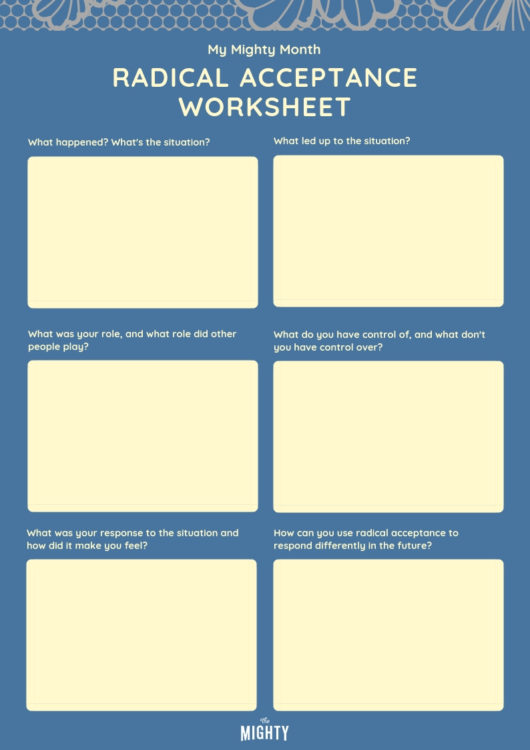
(Click here for a downloadable PDF or here for one you can fill out digitally.)
Also check out these worksheets from the official DBT skills training manual, which explain more about radical acceptance and include an additional step-by-step guide you can try out.
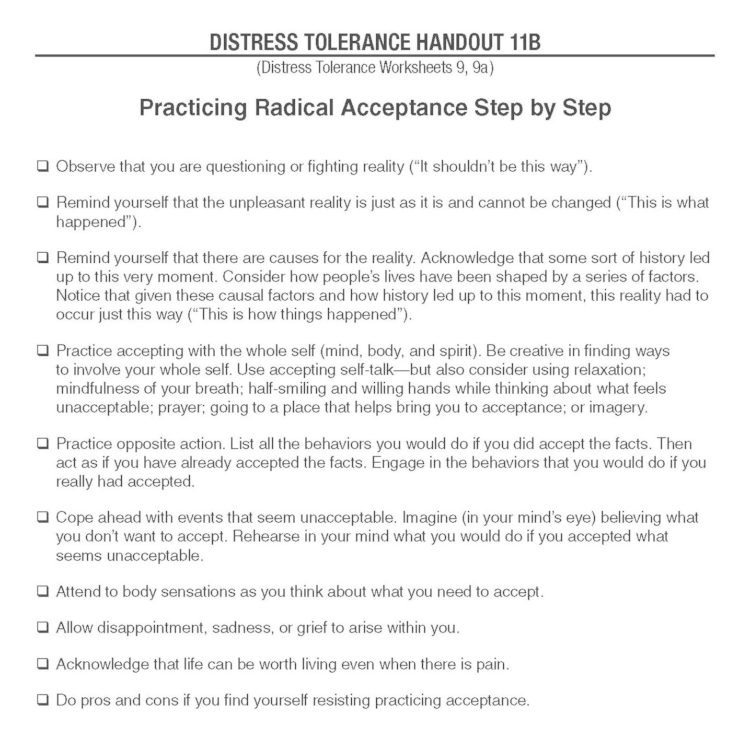 Be ready for some emotions to come up. When I think about accepting what I’ve lost because of my mental illness, I feel grief and sadness. Going through the feelings is an important part of the experience. Work with a therapist if you can. During the process, don’t push yourself too hard — be kind and gentle.
Be ready for some emotions to come up. When I think about accepting what I’ve lost because of my mental illness, I feel grief and sadness. Going through the feelings is an important part of the experience. Work with a therapist if you can. During the process, don’t push yourself too hard — be kind and gentle.
“Radical acceptance is an amazing tool that can help people to accept their current situation,” Voss told The Mighty. “This was so helpful in my life. I was able to accept that I can’t change the way someone else is acting, but I can change the way I respond. Once I was able to accept and stop being resentful, I was able to move forward in a positive way.”
Want to make October a Mighty Month? You can follow our My Mighty Month hashtag here, and don’t forget to tag your posts on The Mighty with #MyMightyMonth and #RadicalAcceptance. You can also sign up for our My Mighty Month emails, (select “Mighty Monthly Challenges” from the newsletter options), which include tips and reminders designed to keep you motivated.

